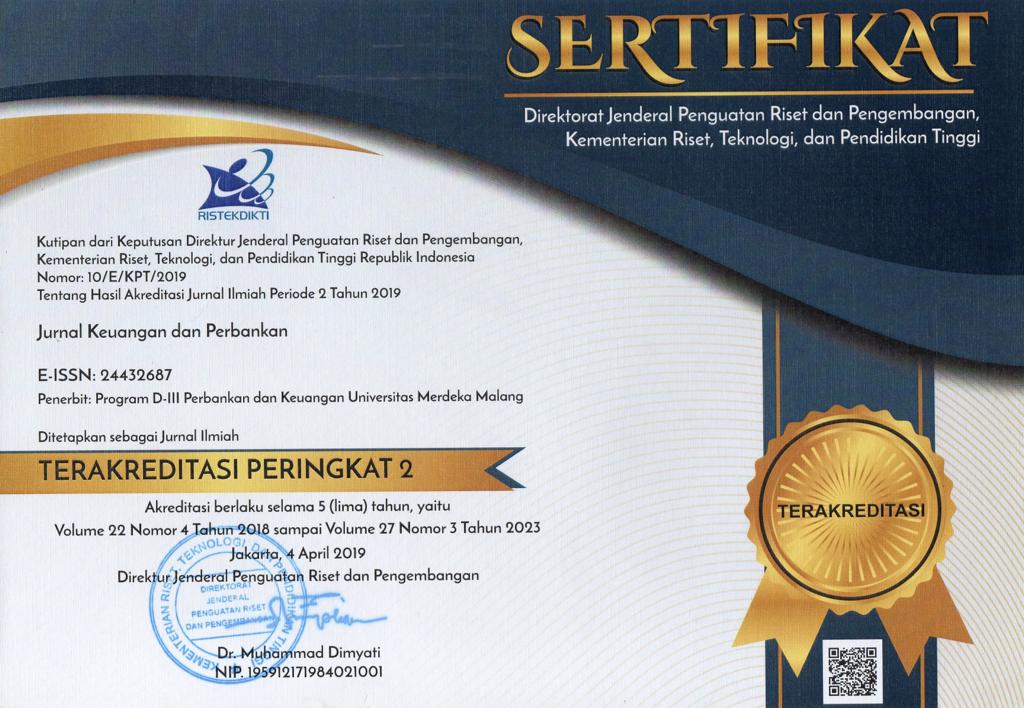THE IMPACT OF GLOBAL ECONOMIC CONTRACTION TOWARDS LENDING BEHAVIOR OF BANKS IN INDONESIA
Abstract
banking industry in Indonesia. This was because first, the experience of the economic crisis of 1997-1998.
Second, the nature of the crisis could spread to other countries. So this study aimed to examine empirically the
impact of the global economic contraction on the behavior of bank credit in Indonesia. Using panel data source
from the Word Bank and Bank Indonesia Year 2004-2012, the data were analyzed with Dynamic Panel Data
using E-views program 8. The results showed that the global economic contraction had a significant effect on
the behavior of credit in foreign and joint venture banks in Indonesia in 2004-2012.
Keywords
Full Text:
pdfReferences
Allen, F., Jackowicz, K., & Kowalewski, O. 2011. The Effects of Foreign and Government Ownership on Bank Lending Behavior During A Crisis in Central and Eastern Europe. Working Paper No. 13-25. Wharton Financial Institutions Center.
Baltagi, B.H. 2005. Econometric Analysis of Panel Data, England. John Wiley & Sons Ltd. The Atrium, Southern Gate, Chichester, West Sussex.
Bebczuk, R., Burdisso, T., Carrera, J., & Sangiácomo, M. 2010. A New Look Into Credit Procyclicality: International Panel Evidence. Central Bank of Argentina. Buenos Aires.
Choi, M.J., Gutierrez, E., & Peria, M.S.M. 2013. Dissecting Foreign Bank Lending Behavior During the 2008–2009 Crisis. Policy Research Working Paper 6674. The World Bank & Latin America and the Caribbean Region Finance and Private Sector Development Unit.
De Haas, R. & van Lelyveld, I. 2006. Foreign Banks and Credit Stability in Central and Eastern Europe. A Panel data analysis. Journal of Banking and Finance, 30(1):1927-1952.
De Haas, R. & van Lelyveld, I. 2010. Internal Capital Markets and Lending By Multinational Bank Subsidiaries. Working Paper No.105. European Bank for Reconstruction and Development.
De Haas, R. & van Lelyveld, I. 2014. Multinational Banks and The Global Financial Crisis: Weathering The Perfect Storm? Journal of Money, Credit, and Banking 46(1): 333-364.
Guo, K. & Stepanyan, V. 2011. Determinants of Bank Credit in EMEs. Working Paper 11/51. IMF.
Kotz, H. 2010. Long-Term Issues in International Banking. CGFS Papers No 41. Bank for International Settlements.
Micco, A. & Panizza, U. 2006. Bank Ownership and Lending Behavior. Economics Letters 93, 248–254.
Mohanty, M. S., Schnabel, Gert and Garcia-Luna, Pablo. 2006. Banks and Aggregate Credit: What is New? BIS Papers No 28. Bank for International Settlements
Raz, A.F., Indra, T.P. K., Artikasih, D.K., Citra, S. 2012. Crisis Keuangan Global dan Pertumbuhan Ekonomi: Analisa dari Perekonomian Asia Timur. Buletin Ekonomi Moneter dan Perbankan, 15(2): 37-56.
Pontines, V. & Siregar, R. 2012. How Should We Bank With Foreigners? An Empirical Assessment of Lending Behaviour of International Banks To Six East Asian Countries. Working Paper 4. Centre For Applied Macroeconomic Analysis.
Prasetyantoko., A. 2008. Bencana Finansial: Stabilitas Sebagai Barang Publik. Jakarta: PT Kompas Media Nusantara.
Silalahi, T., Wibowo, W.A., & Nurliana, L. 2012. Impact of Global Financial Shock to International Bank Lending in Indonesia. Buletin Ekonomi Moneter dan Perbankan,1 5(2): 77-114.
DOI: https://doi.org/10.26905/jkdp.v19i2.852
Refbacks
- There are currently no refbacks.
Jurnal Keuangan dan Perbankan (Journal of Finance and Banking)
Diploma Program of Banking and Finance, Faculty of Economics and Business, University of Merdeka Malang
Published by University of Merdeka Malang
Mailing Address:
2nd floor Finance and Banking Building, Jl. Terusan Raya Dieng No. 57 Malang, East Java, Indonesia
Phone: +62 813-3180-1534
Email: jkp@unmer.ac.id
 This work is licensed under a Creative
This work is licensed under a Creative
Commons Attribution-ShareAlike 4.0




